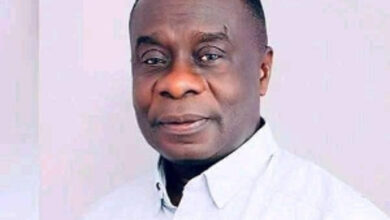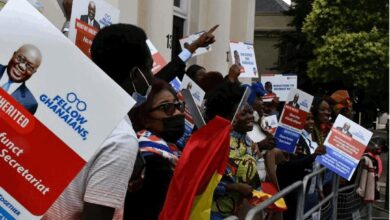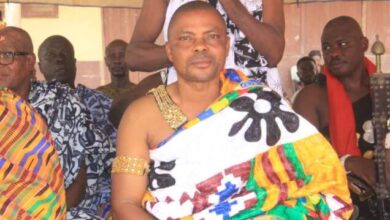
Prof H Kwasi Prempeh argues the law could have been relaxed to enable the petitioner cross-examine Jean Mensa considering the peculiar nature of the case
The executive director of the Centre for Democratic Development (CDD-Ghana) Prof H Kwasi Prempeh has questioned the decision to rule against the cross-examination of the Electoral Commission chairperson Jean Mensa in the ongoing election petition.
He believes the Supreme Court’s decision could erode confidence and trust in public institutions such as the Electoral Commission.
The Supreme Court on Thursday (11 February) ruled that witnesses of the first and second respondents cannot be compelled to mount the witness box to testify in the ongoing 2020 election petition.
The decision by the Supreme Court follows oral arguments made by the lawyers for the first and second respondents that their clients cannot be compelled to testify.
“…Simply put, we are not convinced, and we will not yield to the invitation being extended to us by counsel for the petitioner to order the respondent to enter the witness box to be cross-examined. Accordingly, we hereby overrule the objection raised by the counsel for the petitioner against the decision of the respondents declining to adduce evidence in this petition,” Chief Justice Anin Yeboah said.
However, the CDD boss argues the law could have been relaxed considering the peculiar nature of the election petition.
“What is wrong at any rate, in such a context as this, with asking that the one public official who is charged by law with declaring the election results and who has official custody of all the relevant documentary evidence, must show to the whole world, at no risk to his or her personal freedom, that the declared results, contrary to the petitioner’s allegations, are as they are and as they ought to be,” he posted on Facebook.
He added: “Isn’t that a better social outcome, in a political community struggling to build trust in its institutions, than having a significant portion of the population believe, rightly or wrongly, that the EMB is politically captured or that a certain election was rigged? Is having the Returning Officer for the presidential elections testify under oath in such a proceeding going to cause some irreparable damage to our system of justice and accountability? What exactly is the social cost here? Especially when we can do this without changing the applicability of our hallowed precedents to all other cases to which they must apply.”
Below is the full unedited post:
No progress in the law, or in society generally, has ever come from those who insist on a blind, often self-interested, allegiance to the status quo in the name of custom, tradition, or precedent. You cannot pretend to believe that the law, whether common law or the Constitution, is a living organism, yet insist on an uncritical fidelity to “precedent”, especially one laden with technicality, even when the times and contexts and values have (presumably) changed or don’t apply.
Today, in many jurisdictions, including those self same sources from where we have borrowed our formal legal system and traditions, innovation in the law, including in judge-made law, in response to changing social and institutional realities and dynamics is a constant.
One familiar legal device that has been used quite innovatively, by both legislative and judicial policymakers in serious societies and states, to address particularly difficult social problems and challenges (eg., grand corruption, money laundering) is the placement and shifting of “presumptions” between parties.
By the use of this legal device, some states and judicial systems have managed to wrestle down, for example, organized crime through non-conviction based asset forfeiture and unexplained wealth laws and proceedings. These developments have taken place even in criminal cases, where, unlike in a civil or public law case, the defendant faces a real prospect of imprisonment and consequential loss of liberty.
Hallowed propositions
And this, in the legal cultures from which we get all our hallowed propositions and axioms and like “innocent until proven guilty”, “he who alleges must prove”, et cetera, et cetera. Those jurisdictions are using law to move their societies forward, while still upholding a commitment to freedom, while we, the consummate borrowers that we are, use borrowed law to tie ourselves up in knots in the name of precedent.
Can the precedent-worshippers tell me what exactly Ghana would lose by a court ruling that said that, in the exceptional case of presidential election petition, where the petitioner is able to proffer some evidence that irregularities and illegalities were committed by the electoral commission, the onus would fall on the EC, or the EC may be compelled, to show that, even if the allegations were admitted, the errors or infractions would not affect or change the results?
You might say that, such a rule, by seemingly lowering the evidentiary bar for the petitioner, would encourage “frivolous” presidential election petitions. So what? So what if we got one “frivolous” presidential election petition (which would fail, of course) once every four years? Wouldn’t that be a better social outcome than having no election petition at all because election contestants would now shun the courts and prefer, instead, to fight violently to win at polling stations and collation centers or else turn to violent protests after they have lost?
There is nothing strange with asking that presidential election petitions be treated exceptionally. Election petitions are, after all, special or sui generis; they are not ordinary, everyday cases. This is why they merit and usually get different treatment (e.g., compressed timelines) across jurisdictions.
Legal systems also routinely recognize that presidential election petitions are not just legal cases; they are inherently and unavoidably political in character and posture as well as implicate interests (notably, the will of the electorate) that are not nominally represented in court. Who best to represent or stand in as a surrogate for that interest in the courtroom than the election management body (EMB) itself?
Better social outcome
What is wrong at any rate, in such a context as this, with asking that the one public official who is charged by law with declaring the election results and who has official custody of all the relevant documentary evidence, must show to the whole world, at no risk to his or her personal freedom, that the declared results, contrary to the petitioner’s allegations, are as they are and as they ought to be.
Isn’t that a better social outcome, in a political community struggling to build trust in its institutions, than having a significant portion of the population believe, rightly or wrongly, that the EMB is politically captured or that a certain election was rigged?
Is having the Returning Officer for the presidential elections testify under oath in such a proceeding going to cause some irreparable damage to our system of justice and accountability? What exactly is the social cost here? Especially when we can do this without changing the applicability of our hallowed precedents to all other cases to which they must apply.
Law is a problem-solving tool; a tool for solving social problems. It is but a means to an end, not an end in itself. Or, as the Scriptures render it, the Sabbath (law) was made for Man (society), not Man for the Sabbath. (Mark 2:27).
If all the law and legal institutions can do is erect impenetrable walls in defense of the status quo, all in the name of precedents crafted in different contexts, then they will have failed to understand and appreciate the social purpose, role, and value of law.
Being doctrinaire about precedent has never advanced society or the law anywhere. The iconoclastic Lord Denning did not become the venerated legend in the common law that he is by insisting on a slavish adherence to precedent, come hell or high water!
I rest.
Prof H Kwasi Prempeh
Source: asaaseradio






